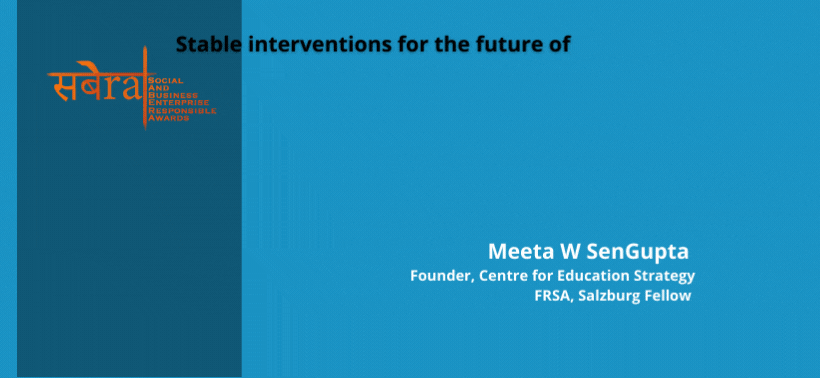Listen to the article here
Education Leadership is the frontline of the battle between the old and the new.
While the job of education, and indeed educators, is to enable new knowledge, the task is to build stable structures. This is asking the leader to be both pulling forward and holding skill. It gets tougher – this is not just the process, but also the product. Education is unique in one way: It is responsible for nurturing the creators of the future by using the ways of the past.
The Paradox
This is a paradox, one of many in education. The education leader almost faces an impossible task – to be both old and new, to be innovative and traditional, to bring change and ensure stability, and all the while ensuring that the school (or university) gets noticed for its shining outcomes, and is invisible in all other ways. Education leadership, you could say, is about walking the tightrope and it is no wonder that most people in these roles are formidable achievers.
Triad Role
Education leadership is best understood if we are able to split it into three distinct roles – one of academic leadership, the second of administrative leadership, and the third, challenging the establishment. This third type of leadership is an integral part of education, often found within universities too. But more often than not, we find much of the change, innovation and improvement in education today is started by this third leadership outside of traditional education establishments. Each of these three types of leadership has a different type of role to perform, and for this reason, in practice we see these done by different people, or often in different organisations.
Administrative Leadership
Traditional teaching institutions that include schools, colleges and some segments of universities require more administrative leadership. The task here is to keep systems running. Education systems, the ones that churn out us geniuses year upon year, depend upon being – dependable. Reliable. Consistent. And so, bureaucratic. It is a rule in education that each year should look almost exactly like the previous one, and this stability ensures that we are providing the same standard of service to each generation.
Academic Leadership
Rests on this balance too – one cannot have great discoveries without stable scientific processes. A research organisation fosters Innovation, change and discovery. Each of these is an essential element of improving knowledge, but these are not the best forces for maintaining stability and continuity. It is the battle between these forces that defines progress, and it is the first job of the leader to manage the balance of these forces. Only the best of organisations are not afraid of challenging themselves. Thought leadership is a key output of the education sector, but we like it best when the lens is applied outwards.
Disruptor Leadership
This is why the third sort of educational leader is the rarest – the one who leads with the courage to lead change in their own organisation or knowledge domain. Traditionalists would loath to acknowledge this as it often comes from outside. The ed-tech industry is leading the future of education much more than traditional educational leadership as it leads with the courage to test themselves, the ability to take risks, and the willingness to apply the methods of fail-and-pivot to themselves.
As we acknowledge that educational leadership then is the act of influencing the future by building on the structures of the past, we recognise that true leadership in education is able to create structures for the future too.
Few leaders are able to access a mandate for dramatic changes, but when they do, we see significant progress in the way we create knowledge and share it. As the pandemic just showed us, developing the vaccines in record time was possible only when traditional bounds were ignored in order to collaborate, corroborate and create. Disruption of traditional teaching when replaced by emergency remote learning created capacities at a rate never seen before. The advancement of equity conversations, the need for better access, the challenges of assessment done authentically and so many more real barriers to better learning outcomes were tackled by leaders at a pace that was unprecedented. Leaders recognised their own capacity to move beyond being mere administrators and academics. More so, education leaders learnt to move beyond the yoke of stability, and deal with more uncertainty.
We are not out of the woods yet. Education leaders are straining to go back to the past. The familiarity of administrative leadership and the safety of academic leadership are comfortable spaces, in contrast to the creative disruption that lies ahead. The state of our progress relies on our educators and their choice of the type of leader they become.
Views are personal. The author, Meeta W Sengupta is an educator working to enable stable interventions for the future of education. Meeta is a Salzburg Fellow and Curates Conversations for Sustainable Solutions.
Follow us on Linked in, Twitter, YouTube to never miss an update from SABERA.
SABERA helps amplify Responsible Leadership and voices committed to GOOD. You may also like to read Mukund Rajan’s thoughts on ESG, or Mathew Cherian’s concern on ageing in the 21st century or Anup Vikal’s views on sustainable communities affecting businesses.
We have begun accepting entries for responsible work in alignment with SDG and ESG principles for SABERA 2022. All categories in the Initiative Awards are in alignment with the sustainable development goals. The Entity Awards category recognises organisations and the Individual Awards category, as the name suggests acknowledges individuals from diverse fields as long as they are contributing to the GOOD of the community and the country at large.
Register here to submit work in the education field, or if you are a think tank. For more categories and their criteria click here >>


